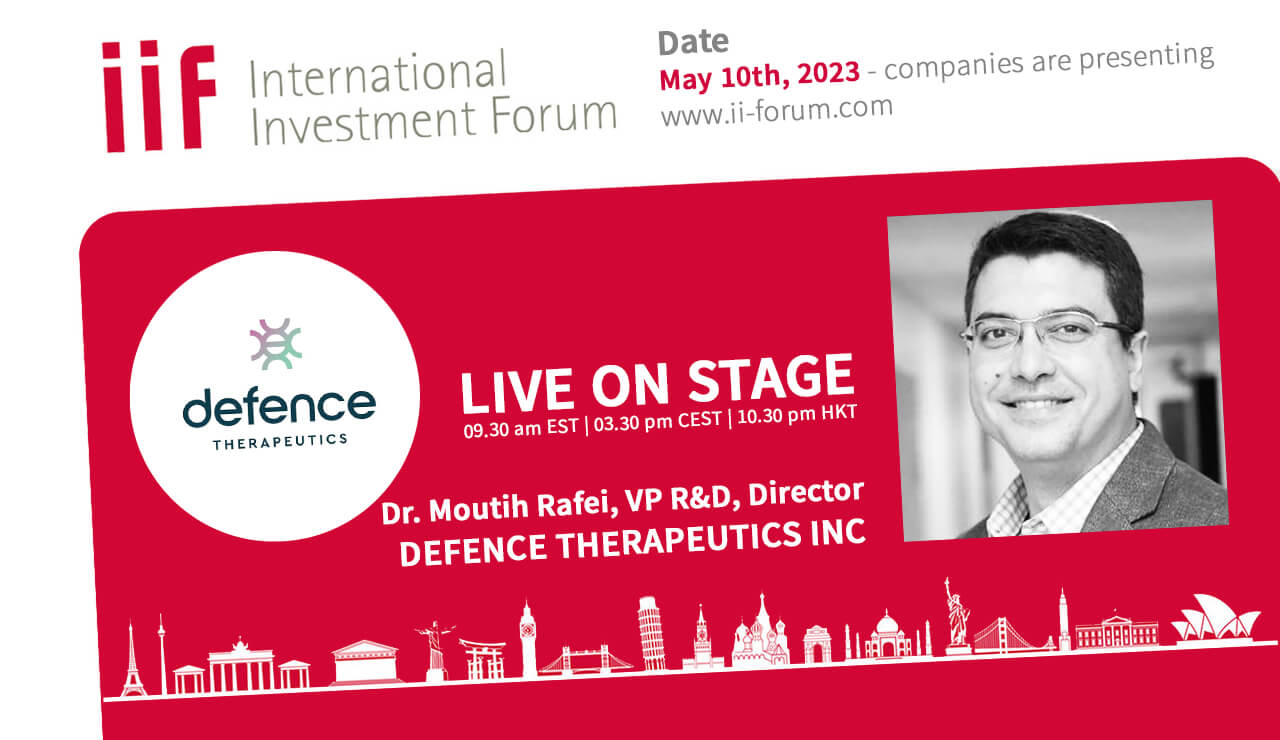April 14th, 2023 | 10:23 CEST
Bayer, Defence Therapeutics, Merck KGaA - Data power ensures high-speed commercialization
Germany is one of the best-funded countries in terms of research-based pharmaceutical companies. Nevertheless, Stefan Oelrich of Bayer Healthcare is critical. He thinks that data protection is putting the brakes on research. Defence Therapeutics, on the other hand, relies on enormous speed. Thanks to their data-driven ACCUM™ platform technology, they are helping mRNA vaccines, in particular, to achieve more intensive results. Pharmaceutical giant Merck is currently experiencing just how valuable data is in the US. In a Phase III clinical trial, the FDA stopped the enrolment of further patients, thus slowing down the research. The reason for the stop, however, is a serious one...
time to read: 4 minutes
|
Author:
Juliane Zielonka
ISIN:
BAYER AG NA O.N. | DE000BAY0017 , DEFENCE THERAPEUTICS INC | CA24463V1013 , MERCK KGAA O.N. | DE0006599905
Table of contents:

"[...] Defence will continue to develop its Antibody Drug Conjugates "ADC" and its radiopharmaceuticals programs, which are currently two of the hottest products in demand in the pharma industries where significant consolidations and take-overs occurred. [...]" Sébastien Plouffe, CEO, Founder and Director, Defence Therapeutics Inc.
Author
Juliane Zielonka
Born in Bielefeld, she studied German, English and psychology. The emergence of the Internet in the early '90s led her from university to training in graphic design and marketing communications. After years of agency work in corporate branding, she switched to publishing and learned her editorial craft at Hubert Burda Media.
Tag cloud
Shares cloud
Bayer - Pharma boss Oelrich "Data protection puts the brakes on research"
Stefan Oelrich, head of Bayer Pharma, has clear words to say about Germany as a location for his division: "It is more difficult here than in other technology nations to obtain anonymized patient data for research." This is due to the lack of interfaces among stakeholders in the healthcare market, such as hospitals and research institutions, as well as data protection concerns.
However, the pharma-friendly Federal Minister of Health Karl Lauterbach published a draft in March this year for the electronic patient record (ePA). With this, user data can be further used directly anonymized unless the patient explicitly does not agree to this (opt-out). It is comparable to digital incapacitation. Apart from a "do not participate at all", the only option is to consent to the further use of the patient data.
Specifically, the draft states: "The aim is to achieve a nationwide switch to the ePA by 2025. Those who do not wish to use it must actively object."
If one takes a closer look at the data situation, Germany is one of the most industry-sponsored clinical trial countries, according to GTAI.
The Association of Research-Based Pharmaceutical Companies vfa also emphasizes on its homepage, "Germany is top in drug research: Every year, research-based pharmaceutical companies invest more than EUR 7 billion in new drugs and innovative therapies".
Oelrich's statement can be seen as political wing flapping to generate more support from the ranks of the liberal party, to promote a technology-friendly research environment in Germany.
Defence Therapeutics - Highspeed development for mRNA vaccines and ADC products
Anyone who invests in pharmaceutical stocks should, above all, be patient. From molecule to a therapeutic agent, including clinical research, it takes around 10 years before a pharmaceutical product can be commercialized. Digitalization is creating new speed in the pipeline. When corresponding data and their endpoints are read more efficiently through technological platforms, it accelerates development. This is precisely the principle that Defence Therapeutics applies.
The Vancouver-based Canadian biotech company is working on the next generation of mRNA vaccines and ADC products. ADCs are an innovative type of cancer-fighting drug that combine antibodies and toxins. The linkage transports the toxin directly to the cancer cell, releasing it to destroy the mutated cell. This concept enables targeted and effective treatment of cancer.
Defence Therapeutics' ACCUM™ platform technology overcomes problematic cell recycling and rejection patterns. It is the first solution to enable ADCs to control the intracellular delivery of chemotherapeutics, resulting in superior preclinical anti-tumour activity.
The Company has successfully applied the ACCUM™ platform to mRNA vaccines. mRNA vaccines are familiar to many investors from COVID vaccines. "By conjugating mRNA with ACCUM™, we expect to enhance the immunogenicity of the vaccine, leading to a strong immune response," says Dr. Rafei, VP Research and Development at Defence Therapeutics. Immunogenicity is the ability of an external substance, such as an antigen, to elicit an enhanced immune response in the body of a human or other animal.
According to a recent study by Precedence Research, the market for
mRNA therapeutics is expected to reach a value of over EUR 117.20 billion by 2030. This growth is expected to occur at a compound annual growth rate of 13.03% from 2022 to 2030. The research results thus show enormous potential for mRNA therapy and underline the importance of this innovative treatment method. Those interested in learning more can register to attend the 7th International Investment Forum on May 10, 2023, to ask Dr. Moutih Rafei, VP R&D, Director questions.

Merck KGaA - FDA halts multiple sclerosis clinical trial
Pharmaceutical company Merck is learning this week how valuable Real World Data and disease-related data endpoints from patients are for pharmaceutical research.
The FDA decided this week that no more patients may be enrolled in treatment as part of a Phase III clinical trial with the MS drug evobrutinib. This affects the initiation of treatment with evobrutinib in new patients in the US as well as those US patients who have been treated with the study drug for less than 70 days. Reason: liver damage in two subjects. The two cases noted were asymptomatic, and the patient's liver enzymes had fully normalized after discontinuing the study medication.
The ongoing Phase III EVOLUTION clinical programme of evobrutinib in patients with relapsing-remitting multiple sclerosis, whose enrolment has been completed, will continue as planned. "Merck is working closely with the FDA to determine the best path forward for the benefit of patients in ongoing and future trials of evobrutinib," the group said in a statement.
Enrolment for a Phase III trial with 2,000 participants has already been completed, and an ongoing trial is expected to continue as planned. Merck expects the first data from this trial to be presented in the fourth quarter of 2023.
Shares rushed down 6.3% as the news leaked, and analysts have expressed concerns about the future tolerability of this class of drugs. The pharma group's shares closed at EUR 161.25, but the closing price on the last trading day was EUR 173.30.
Defence Therapeutics is ahead in development speed thanks to its data-based platform technology for both mRNA vaccines and ADC products in the fight against cancer. Bayer's pharmaceutical research in Germany is lagging. But with the current health minister's push for digital patient records, this may change as early as next year. Merck, on the other hand, has to be patient to make progress in the study for its MS drug. If you like data, bet on Defence Therapeutics and take a close look at Bayer. A change of leadership is imminent there in a few weeks.
Conflict of interest
Pursuant to §85 of the German Securities Trading Act (WpHG), we point out that Apaton Finance GmbH as well as partners, authors or employees of Apaton Finance GmbH (hereinafter referred to as "Relevant Persons") may hold shares or other financial instruments of the aforementioned companies in the future or may bet on rising or falling prices and thus a conflict of interest may arise in the future. The Relevant Persons reserve the right to buy or sell shares or other financial instruments of the Company at any time (hereinafter each a "Transaction"). Transactions may, under certain circumstances, influence the respective price of the shares or other financial instruments of the Company.
In addition, Apaton Finance GmbH is active in the context of the preparation and publication of the reporting in paid contractual relationships.
For this reason, there is a concrete conflict of interest.
The above information on existing conflicts of interest applies to all types and forms of publication used by Apaton Finance GmbH for publications on companies.
Risk notice
Apaton Finance GmbH offers editors, agencies and companies the opportunity to publish commentaries, interviews, summaries, news and the like on news.financial. These contents are exclusively for the information of the readers and do not represent any call to action or recommendations, neither explicitly nor implicitly they are to be understood as an assurance of possible price developments. The contents do not replace individual expert investment advice and do not constitute an offer to sell the discussed share(s) or other financial instruments, nor an invitation to buy or sell such.
The content is expressly not a financial analysis, but a journalistic or advertising text. Readers or users who make investment decisions or carry out transactions on the basis of the information provided here do so entirely at their own risk. No contractual relationship is established between Apaton Finance GmbH and its readers or the users of its offers, as our information only refers to the company and not to the investment decision of the reader or user.
The acquisition of financial instruments involves high risks, which can lead to the total loss of the invested capital. The information published by Apaton Finance GmbH and its authors is based on careful research. Nevertheless, no liability is assumed for financial losses or a content-related guarantee for the topicality, correctness, appropriateness and completeness of the content provided here. Please also note our Terms of use.




